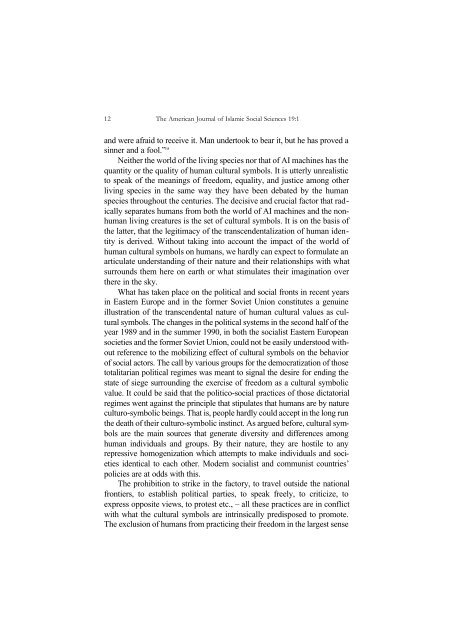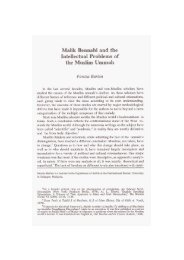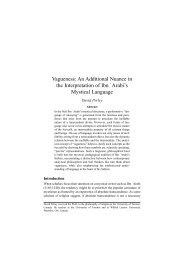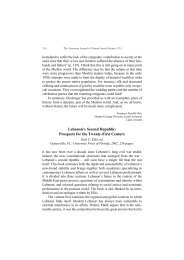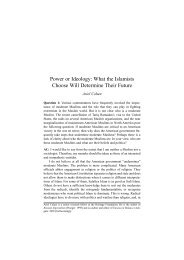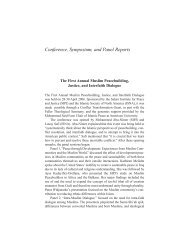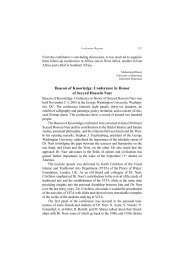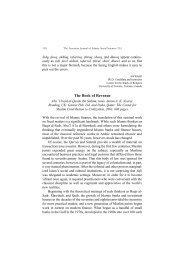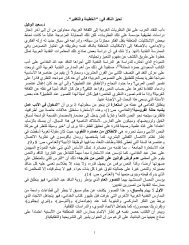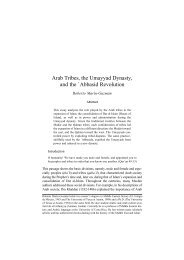Social Science's Need for a Cultural Symbols ... - Epistemology
Social Science's Need for a Cultural Symbols ... - Epistemology
Social Science's Need for a Cultural Symbols ... - Epistemology
You also want an ePaper? Increase the reach of your titles
YUMPU automatically turns print PDFs into web optimized ePapers that Google loves.
12 The American Journal of Islamic <strong>Social</strong> Sciences 19:1<br />
and were afraid to receive it. Man undertook to bear it, but he has proved a<br />
sinner and a fool.” 18<br />
Neither the world of the living species nor that of AI machines has the<br />
quantity or the quality of human cultural symbols. It is utterly unrealistic<br />
to speak of the meanings of freedom, equality, and justice among other<br />
living species in the same way they have been debated by the human<br />
species throughout the centuries. The decisive and crucial factor that radically<br />
separates humans from both the world of AI machines and the nonhuman<br />
living creatures is the set of cultural symbols. It is on the basis of<br />
the latter, that the legitimacy of the transcendentalization of human identity<br />
is derived. Without taking into account the impact of the world of<br />
human cultural symbols on humans, we hardly can expect to <strong>for</strong>mulate an<br />
articulate understanding of their nature and their relationships with what<br />
surrounds them here on earth or what stimulates their imagination over<br />
there in the sky.<br />
What has taken place on the political and social fronts in recent years<br />
in Eastern Europe and in the <strong>for</strong>mer Soviet Union constitutes a genuine<br />
illustration of the transcendental nature of human cultural values as cultural<br />
symbols. The changes in the political systems in the second half of the<br />
year 1989 and in the summer 1990, in both the socialist Eastern European<br />
societies and the <strong>for</strong>mer Soviet Union, could not be easily understood without<br />
reference to the mobilizing effect of cultural symbols on the behavior<br />
of social actors. The call by various groups <strong>for</strong> the democratization of those<br />
totalitarian political regimes was meant to signal the desire <strong>for</strong> ending the<br />
state of siege surrounding the exercise of freedom as a cultural symbolic<br />
value. It could be said that the politico-social practices of those dictatorial<br />
regimes went against the principle that stipulates that humans are by nature<br />
culturo-symbolic beings. That is, people hardly could accept in the long run<br />
the death of their culturo-symbolic instinct. As argued be<strong>for</strong>e, cultural symbols<br />
are the main sources that generate diversity and differences among<br />
human individuals and groups. By their nature, they are hostile to any<br />
repressive homogenization which attempts to make individuals and societies<br />
identical to each other. Modern socialist and communist countries’<br />
policies are at odds with this.<br />
The prohibition to strike in the factory, to travel outside the national<br />
frontiers, to establish political parties, to speak freely, to criticize, to<br />
express opposite views, to protest etc., – all these practices are in conflict<br />
with what the cultural symbols are intrinsically predisposed to promote.<br />
The exclusion of humans from practicing their freedom in the largest sense


